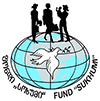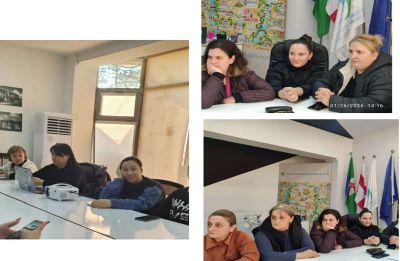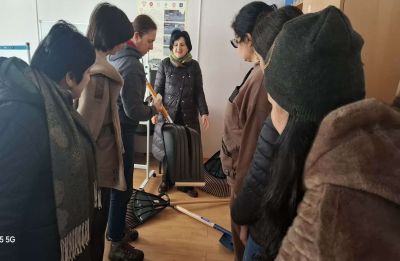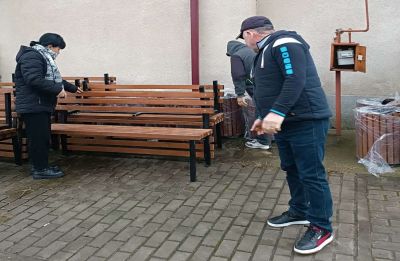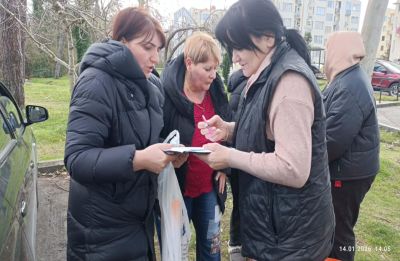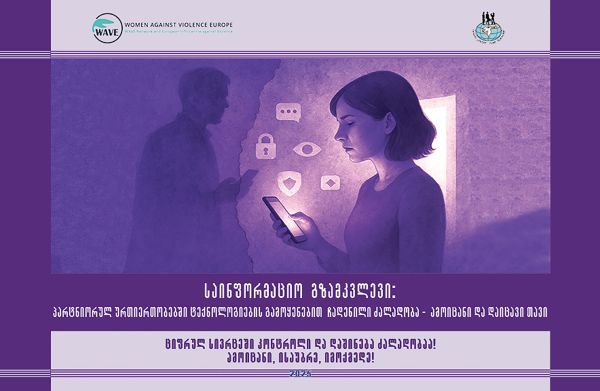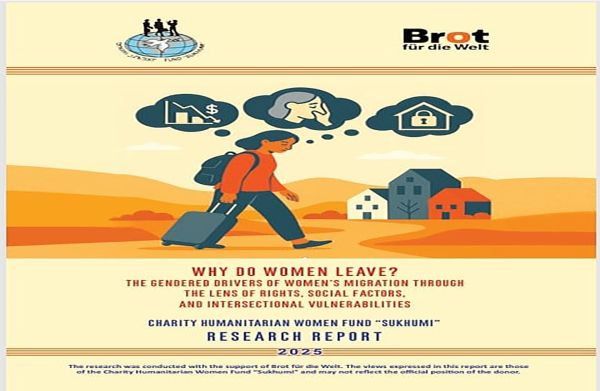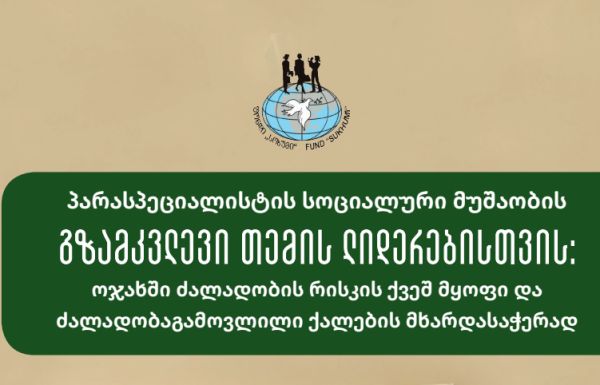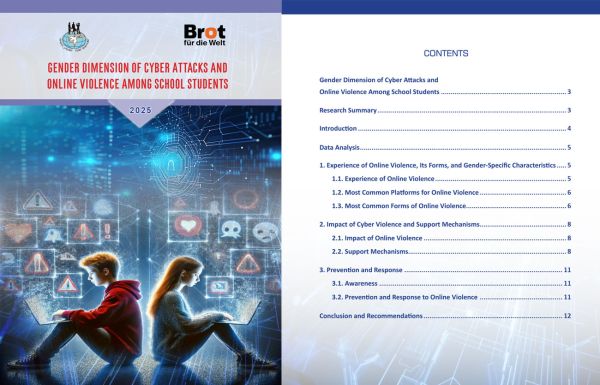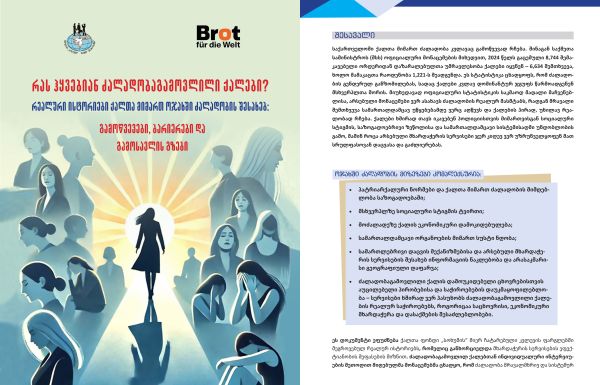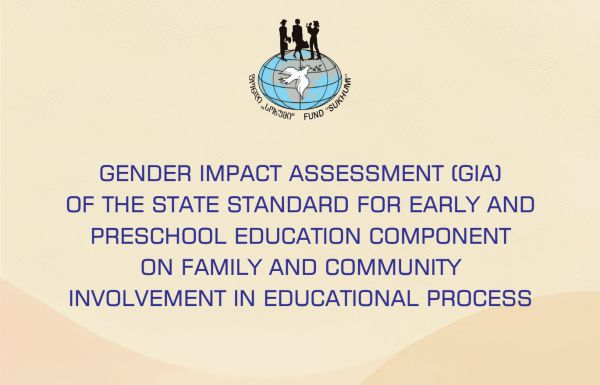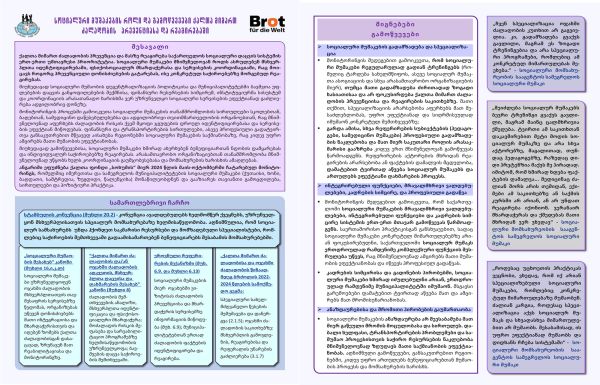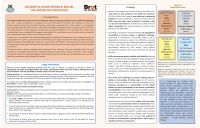The brochure “Technology-Facilitated Violence in Intimate Relationships – Recognize and Protect Yourself” is a practical guide designed to help women and girls identify and respond to digital forms of abuse such as surveillance, control, and intimidation. It outlines the main types of technology-facilitated violence, legal protection mechanisms, and prevention tools—raising awareness and encouraging action: recognize, speak up, act!
The publication is prepared by the Charity-Humanitarian Women Fund "Sukhumi" with the support of the WAVE Network.
The project implemented with the support of the WAVE Network
Women Fund “Sukhumi’s” new report “Why Do Women Leave? The Gender Dimension of Women’s Migration Drivers Through the Lens of Rights, Social Factors, and Intersectional Vulnerability” presents the findings of a study conducted in 11 municipalities of Western Georgia, involving 600 women respondents. The report analyses the phenomenon of women’s migration from a gender perspective, viewing migration not merely as an economic process but as one rooted in multifaceted social, rights-related, and structural causes.
The data reveals that for many women migration is not a matter of choice but rather a forced strategy to escape domestic violence, rights-based subordination, and lack of social services. Migration intentions are particularly high among young and economically active women, which has significant implications for the country’s demographic structure and prospects for social development. The report highlights the role of intersectional vulnerability, such as displacement, proximity to conflict-dividing lines, and social insecurity, which further heighten migration risks. The study demonstrates that preventing forced migration requires comprehensive and gender-sensitive policies oriented towards strengthening women’s economic, social, and rights-based empowerment.
The project is implemented with the support of the organization Brot
für die Welt - Evangelischer Entwicklungsdienst (Germany)
Paraprofessionals in the field of social work are individuals who do not have an academic degree or professional license in social work, but nevertheless play a major role in working with vulnerable groups. Their function is especially important when social services are not available or are very limited.
This is an excerpt from a new publication.
“A Social Work Guide for Community Leaders: Supporting Women Under the Risk of Violence and Surviving Domestic Violence” is a practical and in-depth resource for community and social leaders who work with women at the local level
The project is implemented with the support the Equality Fund (Canada)
The Women’s Fund “Sukhumi” has conducted a new study on the experience of cyber-attacks and online violence among school students, exploring its gender dimensions and impact. The research involved 192 students from ten municipalities in western Georgia, revealing that 25% had personally experienced online violence. TikTok and Facebook were the most common platforms for girls, while boys primarily encountered such incidents in online games. The most widespread forms of violence included offensive rumors, mocking comments about appearance, and sexual harassment, which was particularly prevalent among girls. Online violence has a serious psychological impact on students, leading to anxiety, depression, and low self-esteem. Despite this, the study found that 30% of respondents do not seek any help, which may be linked to stigma and a lack of adequate support.
The research strongly emphasizes that preventing and addressing online violence requires a systemic approach, including strengthening education, increasing parental and educator involvement, and improving legal regulations to make the online environment safer for students.
"What Do Women Survivors Say?" reflects on the harsh realities experienced by domestic violence survivors in Georgia, sharing their personal stories, challenges, and the systemic barriers they face in seeking safety and independence. According to the Ministry of Internal Affairs, in 2024 alone, 8,744 restraining orders were issued, with the vast majority of victims - 6,634 cases - being women. Despite legal progress, many survivors refrain from seeking help due to social stigma, economic dependence, and a lack of accessible support services. Based on research by the Women’s Fund “Sokhumi,” this document assesses the effectiveness of existing assistance programs and underscores the urgent need for stronger, more sustainable mechanisms to support women in rebuilding their lives.
A new report of the research “Gender impact assessment of the component of family and community participation in the educational process of the state standard of early and preschool education” has been prepared and published.
The report describes the impact of this standard on students, parents, communities and preschool institutions. The report presents interesting conclusions and recommendations based on the identified needs. Also suggestions of parents, teachers and specialists in this field.
The project is implemented with the support of the organization Brot
für die Welt - Evangelischer Entwicklungsdienst (Germany)
The Women Fund "Sukhumi" monitoring brief, based on data collected from research conducted between May and October 2024, reviews the role and effectiveness of social workers in the prevention of and response to violence against women. The report highlights the challenges impacting the efficiency of social workers, including coordination difficulties with referral entities such as schools, kindergartens, medical institutions, and local self-government bodies, which hinder the timely identification of women at risk of violence and limit their access to necessary services.
Particular attention is given to the diverse responsibilities and functions of social workers, often leading to professional overload. The brief examines structural challenges, such as limited financial resources, insufficient staffing, and the lack of transportation, which severely affect the effectiveness of their work, particularly in the regions.
The monitoring also identifies successful practices, including the high level of trust between beneficiaries and social workers, close collaboration with municipal child rights protection departments, and effective cooperation with non-governmental organizations. The report draws on the experiences of social workers from the Imereti and Samegrelo regions (Kutaisi, Khoni, Baghdati, Samtredia, Zugdidi, Tsalenjikha municipalities), and provides recommendations aimed at strengthening social services, improving coordination, and enhancing overall effectiveness.
Introducing the latest brief report by the Women Fund "Sukhumi", which assesses the effectiveness of shelters and crisis centers while identifying critical gaps and challenges. The report highlights issues such as limited geographical accessibility, insufficient psychological and multilingual support services, and the absence of childcare options for young children—factors that hinder women survivors of domestic violence from fully utilizing these facilities. It also notes that the 2023 legislative amendments, which removed the "victim status" requirement for accessing services, have yet to be implemented in municipal programs, further limiting access to local support services.
The report emphasizes the need for effective monitoring and follow-up support mechanisms to facilitate the reintegration and independent living of women survivors after leaving shelters. It advocates for strengthening shelters systemically and developing sustainable, effective rehabilitation models to provide comprehensive assistance and safeguard the rights of women affected by violence.
We present our new video about four policy briefs highlighting the risk factors of violence against women. The study involved 1,027 women from 10 municipalities, with the reports focusing on key issues important to vulnerable women.
The risk indicator map is available here - https://sosfsokhumi.ge/fsdata2024
